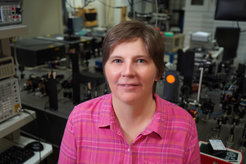Gentner-Kastler Prize 2021 for Nathalie Picqué
The DPG awards Nathalie Picqué with the 2021 Gentner-Kastler Prize for outstanding contributions to high-resolution broad-field molecular spectroscopy with frequency combs.

Nathalie Picqué in her natural habitat: the laboratories at MPQ.
"The award recognizes the work of many people, especially past and present students and post-docs, colleagues, collaborators and staff, over twenty years. Optimistically, it will help enhancing the visibility of our small but growing community so that more people become aware of the powerful opportunities that have emerged. Broadband spectroscopy and interferometry with laser frequency combs have already produced many compelling results, but I am sure that the most exciting advances are yet to come."
For almost a hundred years, high-resolution molecular spectroscopy has provided essential information about the structure and dynamics of molecules, which is necessary to validate and further develop quantum chemical algorithms. Likewise, these highly accurate data serve as a reference for remote sensing measurements of the atmosphere, among other things for monitoring the ozone layer and air quality. Until about ten years ago, Fourier transform spectrometers (Michelson interferometers with a moving mirror) and various types of tunable lasers were used almost exclusively for this purpose.
The discovery of frequency combs in 1998 (Nobel Prize in Physics 2005) has made new methods possible for high-resolution molecular spectroscopy, in the development of which Nathalie Picqué played a major role. These methods not only improve the spectral accuracy and the signal-to-noise ratio of the spectrometers available up to now, but also shorten the effective measurement time by several orders of magnitude in some cases, and do so entirely without moving components. In the meantime, thanks in part to the work of Nathalie Picqué, these "dual-comb" spectrometers are even available in ultraminiaturized versions on individual semiconductor chips.
This field of research allows numerous new applications in chemistry, biology and environmental sciences, but also in fundamental physics, for example for precision measurements of various natural constants.
Nathalie Picqué has been a researcher at the French Centre National de la Recherche Scientifique since 2001 and has worked at the Max Planck Institute of Quantum Optics in Garching since 2008. She began her scientific career at the École Polytechnique and the Université Pierre et Marie Curie in Paris; in 1998 she received her doctorate in Orsay, where she habilitated in 2006. From 1999 to 2000, she was a Marie Curie Fellow at the European Laboratory for Nonlinear Spectroscopy (LENS) in Florence.
The Gentner-Kastler Prize is awarded jointly by the DPG and the Société Française de Physique. It is awarded annually for particularly valuable scientific contributions to physics, alternately to a physicist living and working in Germany or France. The award consists of prize money of 3,000 euros, a silver medal with portraits of Wolfgang Gentner and Alfred Kastler, and a certificate.
[Source: : DPG; https://www.pro-physik.de/nachrichten/gentner-kastler-preis-2021-fuer-nathalie-picque]












